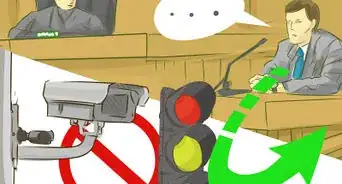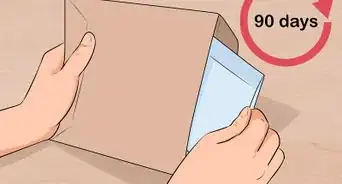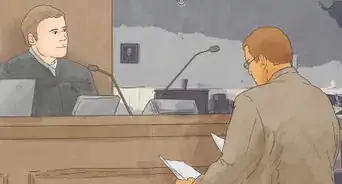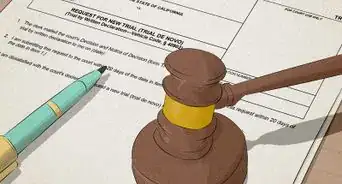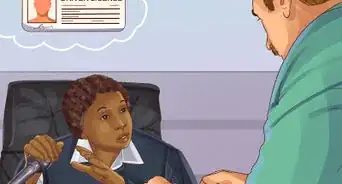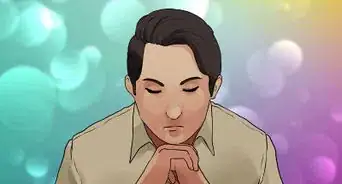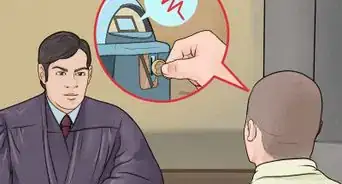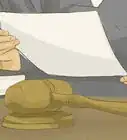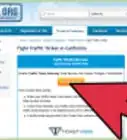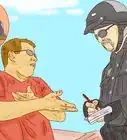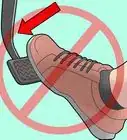This article was written by Jennifer Mueller, JD. Jennifer Mueller is an in-house legal expert at wikiHow. Jennifer reviews, fact-checks, and evaluates wikiHow's legal content to ensure thoroughness and accuracy. She received her JD from Indiana University Maurer School of Law in 2006.
There are 9 references cited in this article, which can be found at the bottom of the page.
This article has been viewed 1,934,462 times.
You know that you didn't break any traffic laws or speed limits—but the traffic ticket you have says otherwise. In most jurisdictions, minor traffic violations such as speeding are infractions, not crimes, so you don't have the same rights as defendants do in the criminal courts (like the right to a jury or the right to a free attorney). At the same time, many moving violations are strict liability offenses, which means your intent is irrelevant.[1] Try not to worry, though. Fighting a traffic ticket is doable if take the proper steps and employ the right strategies. Read on to learn the most thorough and effective way to contest your ticket, so you don't get any points added to your license in the long run.
Steps
Reviewing Your Ticket
-
1Check your ticket for accuracy. Immediately after the officer gives you the written citation, make sure all the information is correct, including anything identifying you or describing your car.
- Missing or incorrect information on your ticket may be grounds for dismissal.[2] It has to be significant, however. For example, if the officer says you have a navy blue BMW when you, in fact, have a black BMW, this probably is not a big enough difference to justify dismissal of your speeding ticket. If the officer writes the ticket for a red Honda Civic when you actually have a navy blue BMW, that's a different story.
-
2Make note of the exact code sections you're cited for violating. The officer will either check off or write down the exact sections of the city or state traffic code he claims you didn't follow.
- If you don't understand what you did wrong, ask the officer on the scene before she leaves. You want to make sure you understand exactly why you were pulled over and why you're being given a ticket.
Advertisement -
3Find out the exact procedure for contesting your ticket. Typically the citation itself will have contact information for either paying your fine or disputing the ticket.
Gathering Evidence
-
1Record all relevant details from the scene of the incident. As soon as possible, make a record of the time of day when you were stopped, where you were stopped, what the weather was like, how much traffic was on the road, how long you were detained, and any other relevant information.
- Since many laws rely on subjective judgment, all of these details can help support your understanding of the situation. For example, in 20 states – including California, Texas, and Utah[3] – speed limits are not absolute and you can make a judgment call as to whether it is safe to exceed the speed limit. Although you could still get a ticket, you could use circumstances from the time of the incident to argue you were operating your vehicle safely.[4]
-
2Take statements from witnesses. If you had anyone in the car with you, or if there were people nearby who saw you get pulled over, find out if they're willing to make a statement on the record about what they saw.
- If you have eyewitnesses who are willing to testify on your behalf, make sure you have their names and contact information before you leave the scene.
- Passengers or bystanders who will testify to your version of events can help you convince the judge that you were right and the police officer's observations were inaccurate.[5]
-
3Take pictures of the area from your perspective and the perspective of the officer. If the officer observed you from a different location before pulling you over, go there and take pictures of what he would have seen.
- This is especially important if your case depends on an obstruction or other dangerous condition. For example, if you had to swerve to avoid a huge pothole and were pulled over and given a citation for an illegal lane change, photos of the pothole would support your argument that your actions were justified.
- You can almost always argue that the officer was not in a good position to see what happened, especially if there are obstructions or if there was heavy traffic.[6]
-
4Find out what devices or equipment the officer used. If the officer's position that you violated the law is based on information provided by a piece of equipment, you will need to verify that the equipment was functioning properly.
- Before you go to trial, request copies of maintenance records and schedules for any of that equipment. If the machines weren't calibrated or maintained according to industry standards, you may be able to get your ticket dismissed on the grounds that the officer's decision was based on unreliable information.
- For example, most radar guns need to be re-calibrated either once a month or once every other month. If the gun was not calibrated, or if the officer did not check the calibration when he issued the ticket, you may be able to get your ticket dismissed.[7]
-
5Get identifying information from the officer. Make sure you have the officer's name, his badge number, and his patrol car number.
- If the officer who issued your citation filed a report or made any notes about the traffic stop, you are entitled to copies of those as well.
Assessing Your Defense
-
1Weigh the pros and cons of fighting the ticket or simply paying the fine. Given the time and effort it would take to fight a traffic ticket, if the infraction is minor and the fine is small, you might be better off simply paying the fine and moving on with your life.
-
2Determine whether you can argue that your actions were due to a mistaken fact. Although ignorance of the law is never an excuse, a legitimate and understandable mistake of a key fact may get you off the hook.[8]
- For example, if you didn't stop at a crosswalk because the paint was so faded it was barely visible, the judge might cut you some slack. However, arguing that you didn't stop because you didn't know you were supposed to stop at a crosswalk won't help you.
-
3Decide if your actions were legally justified or were necessary to avoid harm. Even though you technically violated a traffic ordinance, in some circumstances you must make an illegal maneuver to avoid something far more dangerous.[9]
- For example, if you were swerving to avoid hitting an animal crossing the road, you might be able to get a ticket for an illegal lane change dismissed.
- However, keep in mind that you have to be able to prove that your version of events happened. If there was nobody else in your car who saw the animal and it's going to come down to your word against the word of the police officer, you're probably better off to simply pay the fine.
- Your own inattention or personal need aren't the same thing as avoiding harm. The harm you avoid must be something you didn't cause.[10] For example, if you were having a fight with your sister on your cell phone and ran a red light, that argument would not excuse your actions in the event a police officer pulled you over and wrote you a ticket.
-
4Analyze the code sections you were cited for violating. Find a copy of the code and break the section down into elements. If one of the elements is missing in your case, you can't be held liable.
- Look at the portions of the code where personal judgment come into play. Many traffic laws are not absolute and rely on the driver to make an honest assessment of what conduct is best given weather and highway conditions. For example, speed limits aren't absolute in more than a dozen states – this means that even if you get a ticket for exceeding the speed limit in those states, you can still make an argument that the speed at which you were traveling was safe given the totality of the circumstances.[11]
- Nearly any violation that has the word "unsafe" in it implies a subjective judgment was made on the part of the police officer. Any time you are cited for an unsafe movement, the door is open for you to argue that from your position, your actions were in fact safe.[12]
- If highway signs or signals figured into your citation, check them against the Manual on Uniform Traffic Control Devices, published by the Federal Highway Administration. The MUTCD is a compilation of national standards for all traffic control devices.[13] If you can demonstrate that the relevant sign or signal didn't meet applicable standards, your ticket may be dismissed on those grounds.
Going to Trial
-
1Find out if you can have an attorney represent you. Although you don't have the right to an appointed attorney, you may be able to hire a traffic attorney who can help you fight the ticket.
-
2Consider traffic school. In many jurisdictions, you can attend traffic school and have a minor violation dismissed. Typically this option is only available for first-time offenders or for relatively minor infractions.
- If it's your first ticket in the jurisdiction, you may be able to take a special "no contest" plea in which you pay a reduced fee and the violation doesn't add points to your license or go on your insurance.[14]
-
3Find out if you have the option of trial by declaration. In many states you can have a trial by mail. You write a letter explaining why you shouldn't be held liable for the violation, and then the officer writes in with his side of the story. If the officer fails to write in, you win by default. However, if you lose by mail you can still request an in-person hearing.[15]
-
4Request an in-person hearing, if necessary. You may have automatically been assigned a hearing date, or your city may require you to request a hearing date. If you're responsible for requesting a hearing, do so as soon as possible after you get your ticket so you have a greater choice on dates and times.
- In most jurisdictions, the police officer who issued your citation is required to show up at your hearing. If he does not appear, your ticket may be dismissed automatically.
- If you were given a specified date, consider postponing it. The officer may also be too busy, have several hearings on that date, or have simply forgotten about you, giving you a shot of getting your ticket thrown out.
- When you call the court to postpone the date, tell the clerk to have the trial on a date that is very inconvenient for the officer, like around the holidays or summer vacation which will annoy the officer. Do not go with the date they recommend, most likely the officer will show up.
- Requesting a continuance also may increase the chances that the officer isn't available to show up.[16]
-
5Appear at your hearing. Dress in clean, professional clothing and arrive early for your hearing. Bring copies of all documents along with any evidence or witnesses you wish to present.
- Treat all court staff with respect. If there are other cases being heard before yours, take a seat and wait your turn. When you are called to come forward, address the judge as "your honor" and don't speak unless you are asked a question.
- Leave your mobile phone or any other electronic devices at home or in the car – don't try to bring them with you into the courtroom.
- Organize your documents and evidence before you get there so you aren't shuffling through papers if the judge asks for something.
-
6Present your defense. When the judge calls on you, explain briefly why you are not liable for the traffic violation. Keep your argument succinct and stick to the facts.
- If you've brought witnesses to testify on your behalf, keep your questions brief and make sure they stay in line with what you're trying to prove rather than digressing.[17]
-
7Listen while the officer presents her side of the story. You can make notes if there's something you want to ask her about. But don't interrupt her or argue with her.
- Don't insult the police officer or accuse her of lying. If it comes down to an argument between you and the police officer without any factual evidence, the judge probably will believe the police officer.
-
8Ask the officer questions. After the officer has finished her testimony, the judge will give you an opportunity to ask her questions.
- You want to establish some doubt in the officer's mind, as well as in the judge's mind. The officer may have walked into that courtroom absolutely convinced that she was correct in giving you a ticket, but if you can place doubt in her mind she may become less sure of herself. If the officer isn't entirely sure, the judge won't be sure either, and might dismiss your ticket.
- Create uncertainty in the officer's mind by challenging her subjective conclusions. Police officers often don't know the exact wording or interpretation of a law. The officer who pulled you over may not have realized that she has to make a judgment call every time she writes a ticket for violating a law that requires safe or responsible vehicle operation.[18] Ask the officer how she came to the conclusion that your driving was unsafe or irresponsible, and then provide her with evidence she didn't have at the time.
- For example, suppose she gave you a ticket for an unsafe lane change. She only saw you swerve erratically into the left lane and then back into the right; however, she didn't see the deer crossing the road that you swerved to avoid. This information might change her judgment, since it would be safer for you to swerve than to hit the deer.
- You also can impeach the officer's testimony by challenging her observations.[19] This is why you talked to witnesses and took photos of the scene.
- For example, suppose you ask the officer to describe the weather conditions when she pulled you over, and she says it was bright and sunny. If you have a photo showing that the conditions actually were gray and cloudy, use it to cast doubt on her observations. When she later says she's certain your car was the one that was speeding, you get the opportunity to ask her how certain she is – as certain as she was that it was bright and sunny?
-
9Accept the judge's ruling. After both sides have presented all evidence, the judge will decide if you are liable for the violation or not.
- If the judge rules against you and you decide you want to appeal, ask the court clerk for information on the appeals process.[20]
Warnings
- Never pay a traffic ticket if you're planning on fighting it. In nearly every jurisdiction, paying a traffic ticket constitutes an admission of guilt.[21]⧼thumbs_response⧽
- Going to court without representation requires sufficient preparation. Make sure to research and list applicable laws for your defense. Gather evidence and bring it with you to trial. It will be essential to also research your constitutional rights as some judges in the past have been biased to law enforcement so if you suspect you're being treated unfairly, politely and calmly tell the judge what you learned from reading the constitution. The police officer will no doubt have knowledge of how the law works and will convince the judge you are guilty so coming to court without preparation leaves you defenseless and prone to lose.⧼thumbs_response⧽
- Never skip court. Doing so will result in the judge issuing a warrant for your arrest. If you are unable to come to court, ask the office clerk for alternative dates for contesting the ticket.⧼thumbs_response⧽
- If you know you're guilty, you might as well pay the ticket because going to court will be time-consuming plus you will be wasting gas, losing a day of work, etc. so it will be smart to accept fault, pay the violation, take this as a lesson, and move on.⧼thumbs_response⧽
References
- ↑ http://traffic.findlaw.com/traffic-tickets/traffic-tickets-basics.html
- ↑ http://www.businessinsider.com/how-to-get-out-of-a-speeding-ticket-2013-7
- ↑ http://www.mit.edu/~jfc/laws.html
- ↑ http://www.nolo.com/legal-encyclopedia/fighting-traffic-ticket-strategies-30091.html
- ↑ http://www.nolo.com/legal-encyclopedia/fighting-traffic-ticket-strategies-30091.html
- ↑ http://www.nolo.com/legal-encyclopedia/fighting-traffic-ticket-strategies-30091.html
- ↑ http://traffic.findlaw.com/traffic-tickets/deciding-if-fighting-traffic-tickets-is-a-good-idea.html
- ↑ http://www.nolo.com/legal-encyclopedia/fighting-traffic-ticket-strategies-30091.html
- ↑ http://www.nolo.com/legal-encyclopedia/fighting-traffic-ticket-strategies-30091.html
- ↑ http://www.nolo.com/legal-encyclopedia/fighting-traffic-ticket-strategies-30091.html
- ↑ http://www.nolo.com/legal-encyclopedia/free-books/beat-ticket-book/chapter1-1.html
- ↑ http://traffic.findlaw.com/traffic-tickets/how-to-fight-traffic-tickets-five-strategies-that-work.html
- ↑ http://mutcd.fhwa.dot.gov
- ↑ http://www.businessinsider.com/how-to-get-out-of-a-speeding-ticket-2013-7
- ↑ http://traffic.findlaw.com/traffic-tickets/deciding-if-fighting-traffic-tickets-is-a-good-idea.html
- ↑ http://traffic.findlaw.com/traffic-tickets/deciding-if-fighting-traffic-tickets-is-a-good-idea.html
- ↑ https://www.lawyers.com/legal-info/criminal/traffic-violations/contesting-your-traffic-ticket.html
- ↑ http://www.nolo.com/legal-encyclopedia/fighting-traffic-ticket-strategies-30091.html
- ↑ http://www.nolo.com/legal-encyclopedia/fighting-traffic-ticket-strategies-30091.html
- ↑ https://www.lawyers.com/legal-info/criminal/traffic-violations/contesting-your-traffic-ticket.html
- ↑ http://traffic.findlaw.com/traffic-tickets/deciding-if-fighting-traffic-tickets-is-a-good-idea.html
About This Article
Fighting a traffic ticket can be a challenge, but if you have hard evidence that the officer made a mistake, you can win the claim. Valid evidence includes witnesses to testify that you were in the right and images proving your innocence. For example, if you didn’t stop at a crosswalk because the paint was faded and you didn’t see it, you might be able to clear your ticket with an image proving this. You’ll need to follow the instructions on your ticket to dispute it. In many states, you can have a trial by mail where you write your argument in a letter. If the officer fails to send in his account, you’ll win by default. Otherwise you may have to go to a hearing. Although you don’t have the right to an appointed attorney, you can still hire a traffic attorney to help you. For more tips from our Legal co-author, including how to read the code sections you were cited for violating, read on.
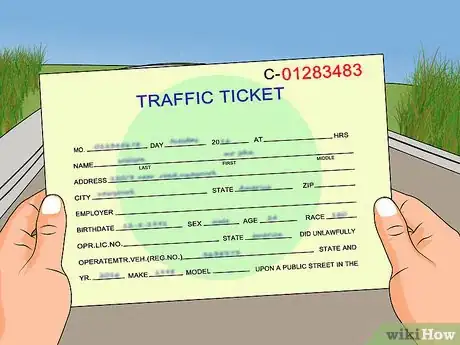


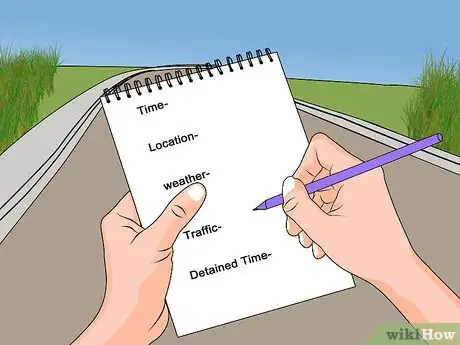
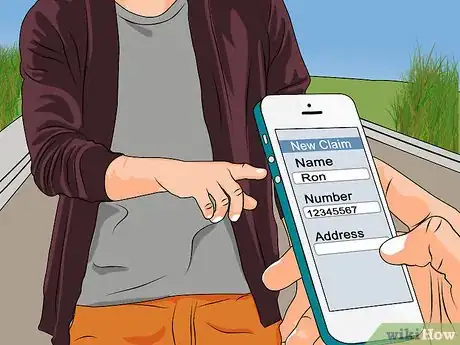
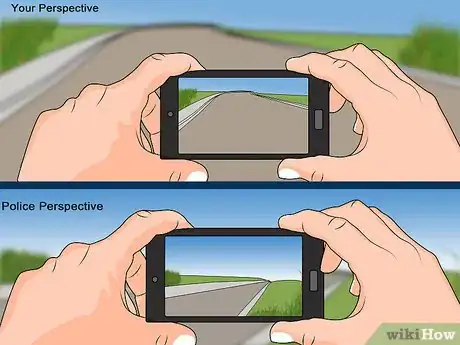
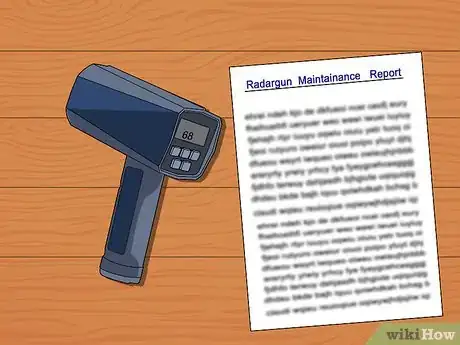
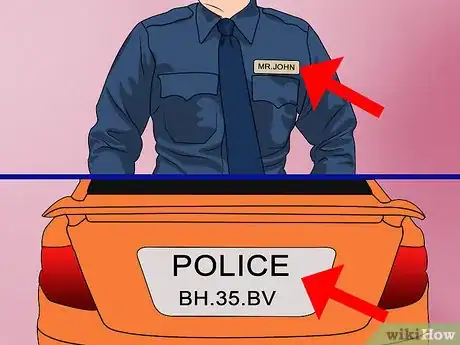
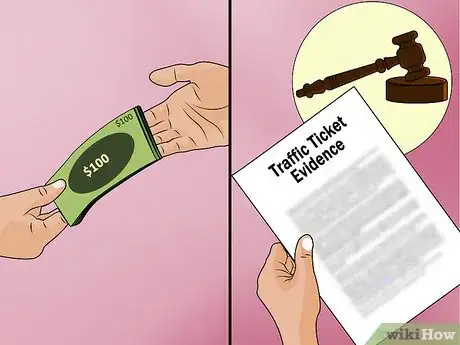


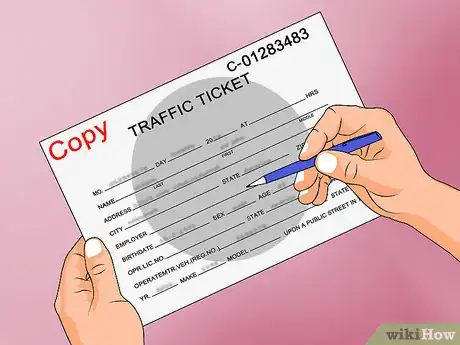
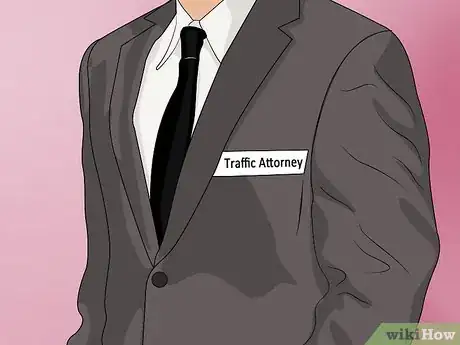

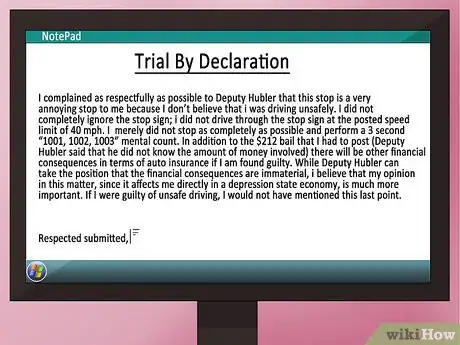

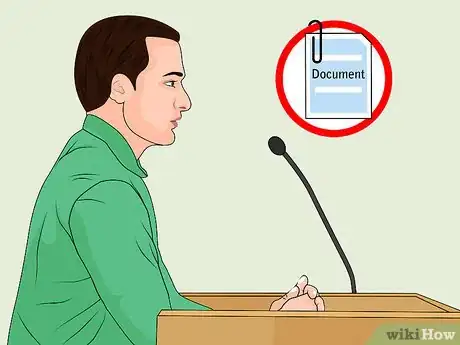
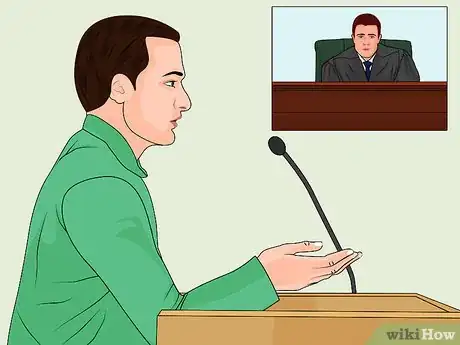
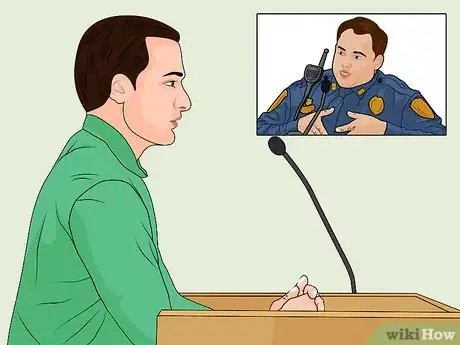
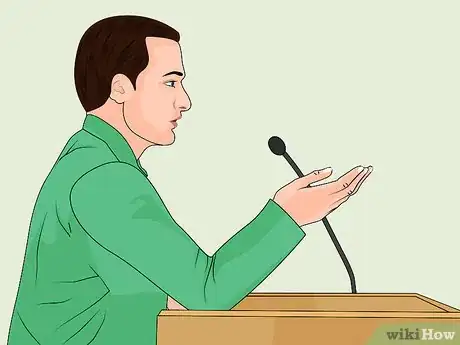
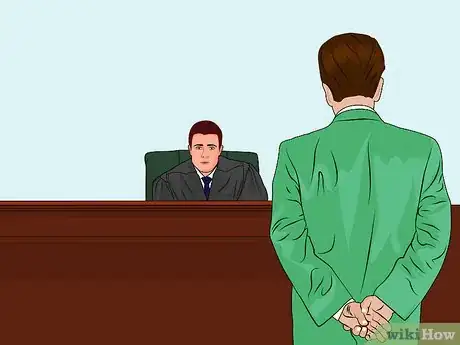
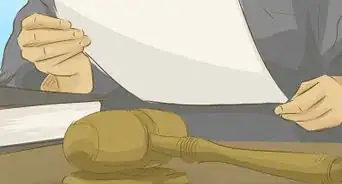
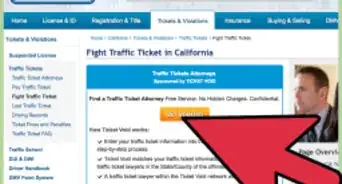

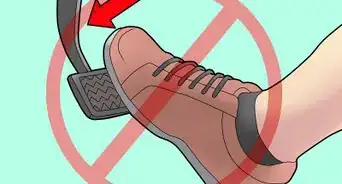

-Step-12.webp)

